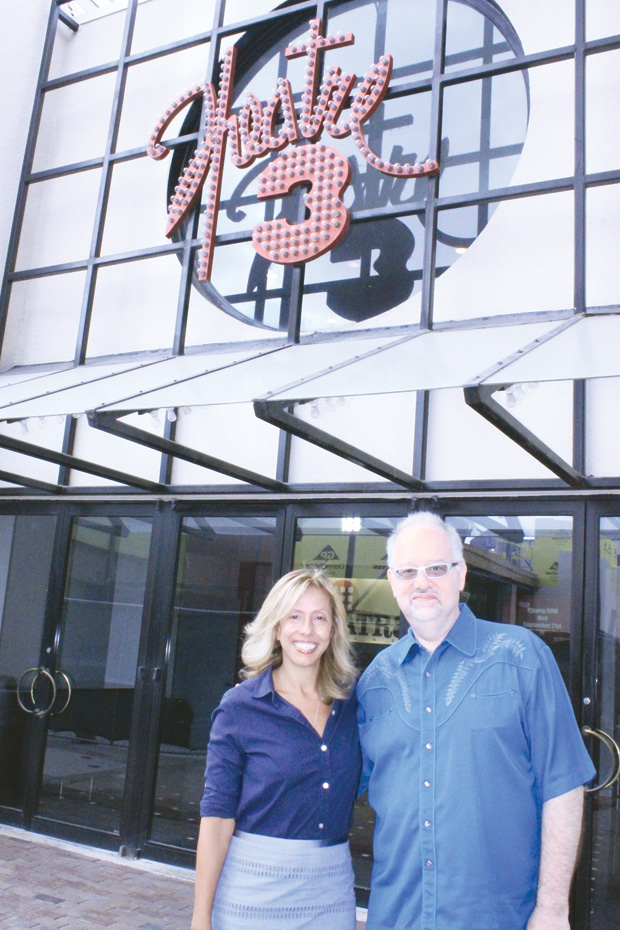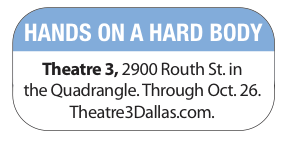How a gay Highland Park intellectual and a nice Jewish girl from the Upper West Side collaborated to create ‘Hands on a Hard Body,’ a touching musical about car-touching Texas rednecks

TEXAS TWO STEPPERS | For Amanda Green, her recent visit to Theatre 3 was a first; for Doug Wright, it has been a homecoming — the Highland Park native started his stage career at this very theater. (Arnold Wayne Jones/Dallas Voice)
Doug Wright is dining over lobster tacos, lamb burgers and onion rings at Dee Lincoln Steak, across from the Quadrangle where his latest musical, Hands on a Hard Body, is receiving its Dallas premiere at Theatre 3.
Wright has been thinking a lot about his home town lately, and not just because he grew up here, cutting his teeth in theater as a kid at T3, working on children’s theater with the late Larry O’Dwyer. His high school alma mater has also been in the news lately, and not for reasons he’s happy about: The school suspended half a dozen books from the syllabus because a clutch of parents objected to sex, violence, abortion and anti-capitalistic sentiments in some of the works.
“I was alarmed, like so many people,” he says when he heard the news about the school’s drastic action. “I felt
I had to respond. No student should be held hostage to a small but vocal group of extremists.”
The decision attracted controversy from several quarters, but having an alum — a Pulitzer Prize and Tony Award winner, no less — chastise the censorship with erudite and persuasive arguments no doubt played a big role in the school back-tracking. Just moments before we sat down for lunch, Wright learned it had reversed its decision.
Knowing this pedigree, you might not expect Wright — a liberal, gay, Yale-educated intellectual — to be drawn to a story about East Texas rednecks involved in a contest to win a pickup truck. And, of course, you’d be wrong. Wright may live now in New York, but he is still a Texan, and he understands the souls of Texans as well as anybody … and he understands how ripe with drama a situation like that can be.
He didn’t need to be convinced. There was already a 1997 documentary with the same name out there, one that attracted Wright because of the humanity at work in the contest to win a Nissan truck by simply keeping a hand on the vehicle the longest. And we’re not talking hours. We’re talking days.
An equal mix of They Shoot Horses, Don’t They? and The 25th Annual Putnam County Spelling Bee, Hands on a Hard Body isn’t about a contest so much as 10 stinging character studies of what drives someone to invest so much in such a strange undertaking.
Hands was Wright’s third produced musical (he also wrote Grey Gardens and The Little Mermaid), but he’s not a composer; he needed to look for a collaborator. And he found an unlikely ally in Amanda Green.
Despite being the offspring of Broadway royalty — her mother is Tony-winning actress Phyllis Newman, and her father is the late Adolph Green, the legendary partner of Betty Comden who, together, wrote the landmark musicals Singin’ in the Rain, The Band Wagon, On the Town and more — Green herself grew up with little interest in Broadway music.
“I’ve always liked country music, and I was obsessed with Nashville,” she says of Robert Altman’s 1975 movie masterpiece, set in Music City, U.S.A. The film’s star was Keith Carradine, who won an Oscar for his song from it, “I’m Easy.” Green was enamored of the laconic movie star.
“I would write a song with Keith in mind,” she says of her preoccupation.
And here’s where fate interceded. Carradine played the title role in the original production of The Will Rogers Follies on Broadway … a show written by Adolph Green.
Amanda finally has a connection to her matinee crush. So when he signed on to play one of the central roles in the Broadway production of Hands on a Hard Body,
 Green’s dream came true: She in fact was writing songs for Carradine.
Green’s dream came true: She in fact was writing songs for Carradine.
Hands is tinged not only with countrified riffs, but also gospel, rock, a tango and other genres that make it endlessly interesting with raise-the-roof numbers and intimate ballads. The pairing also ended up being the perfect marriage: A Texan with a handle on character and a country singer-songwriter with B’way in her DNA, whether she wanted it or not.
“Amanda has spent a lot of time in Nashville, so she has the musical vernacular of these [characters],” Wright says. “It is a show a lot of people of faith embrace, and we decided faith was the language they would understand, their cosmology,” so many songs have the flavor of a tent revival meeting.
“Doug had a handle on these fully fleshed out people when he brought me in,” adds Green, who wrote the lyrics and co-composed, with Phish musician Trey Anastasio, the music. “I enjoyed these complicated, interested, flawed, surprising people. We met of lot of the contestant when we went to Longview, and once you meet someone, you [can’t help but see them as complex people].”
After all their efforts, the Broadway production had a disappointing run — just 28 performances before closing in the spring of 2013. Still, it was enough to net Anastasio and Green Tony nominations for their score, as well as one for Carradine’s performance. And the cast got an opportunity that’s increasingly rare with non-hit musicals:
They recorded an original cast album.
“That was a bittersweet triumph,” Green admits, noting that the cast recorded it just as the show was closing.
“In a way, the [album] was a metaphor for the show — we had all worked on it for a three-year period, and then each one of the characters drops off from the contest” until eventually no one is there.
But someone is there now. This is only the third production since Broadway, and the first Wright has had a chance to see. Green saw the prior two, one of which — produced in Houston — made so many unauthorized changes to the script and score they shut it down.
“Authors make so many sacrifices to maintain our copyright,” Wright explains. “You can’t just change things without our permission.” Pride in ownership extends to seeing a vision realized and reinterpreted, but also demanding truth to a work that meant so much to its creators.
Wright was able to see Theatre 3’s version of Hands three times before the official opening night this week (Green once before), and both concur that the intimate setting is conducive to the effectiveness of the show. And even though it wasn’t the New York hit they’d hoped it would be, they are happy it has life outside the city. And the tinkering is done.
“There are no perfect plays, but there are many finished ones,” Wright observes about the tendency of some authors to perpetually rewrite even successful works. “I could not rewrite I Am My Own Wife or Quills now, because when I wrote them, I had to write them. But the me who wrote them isn’t me anymore.”
Like the contestants in Hands on a Hard Body, you’ve gotta know when to let go.
This article appeared in the Dallas Voice print edition October 3, 2014.















